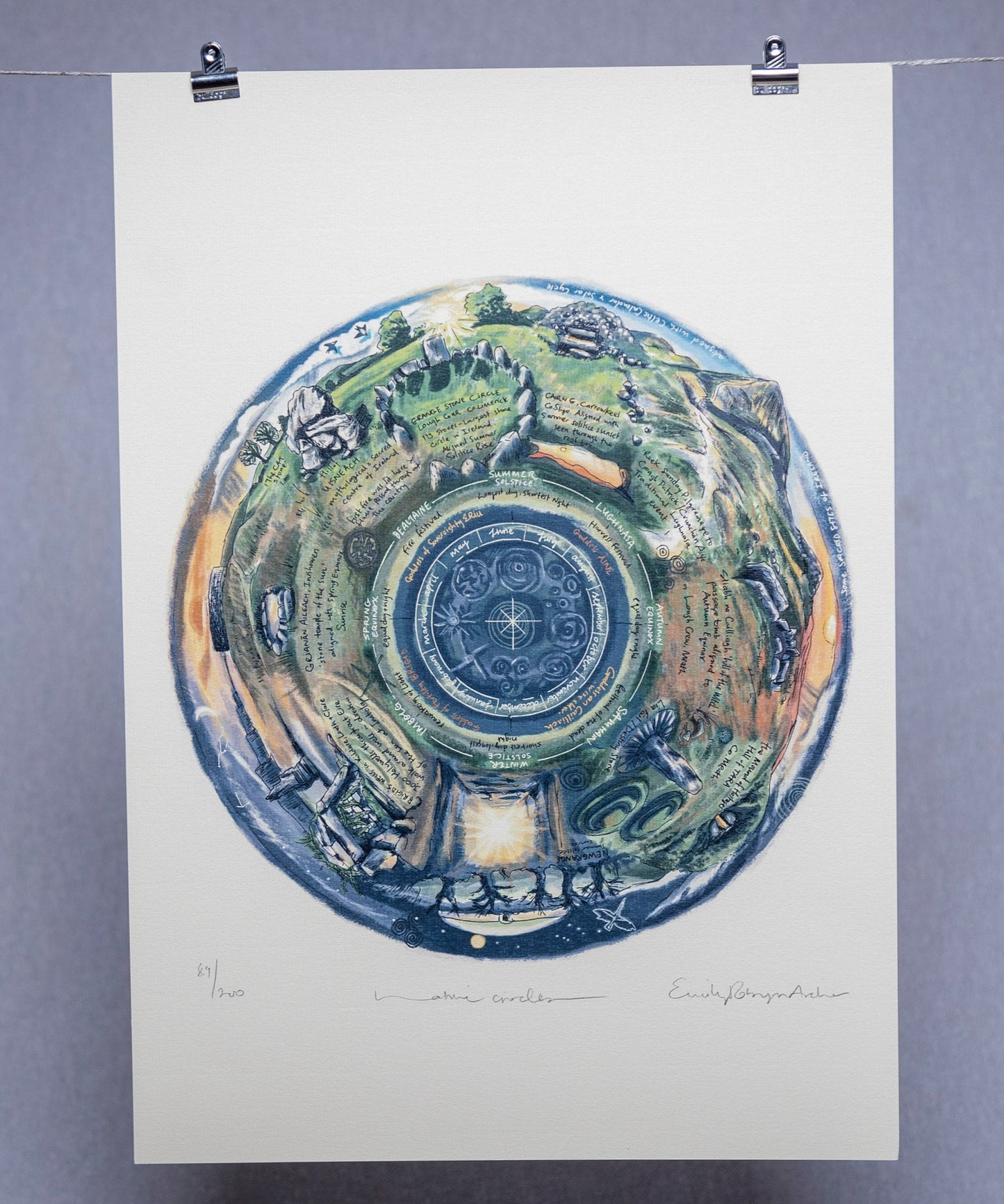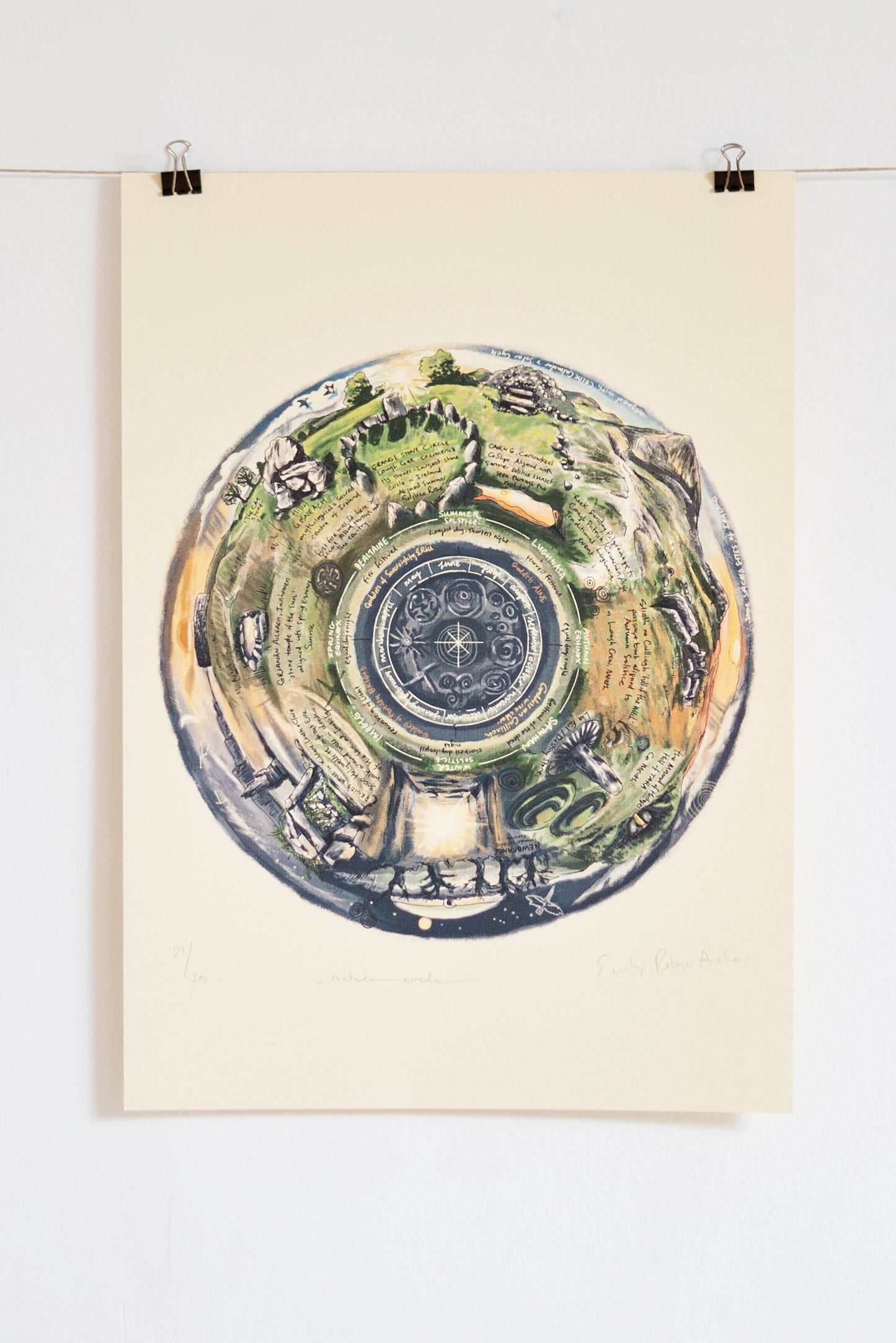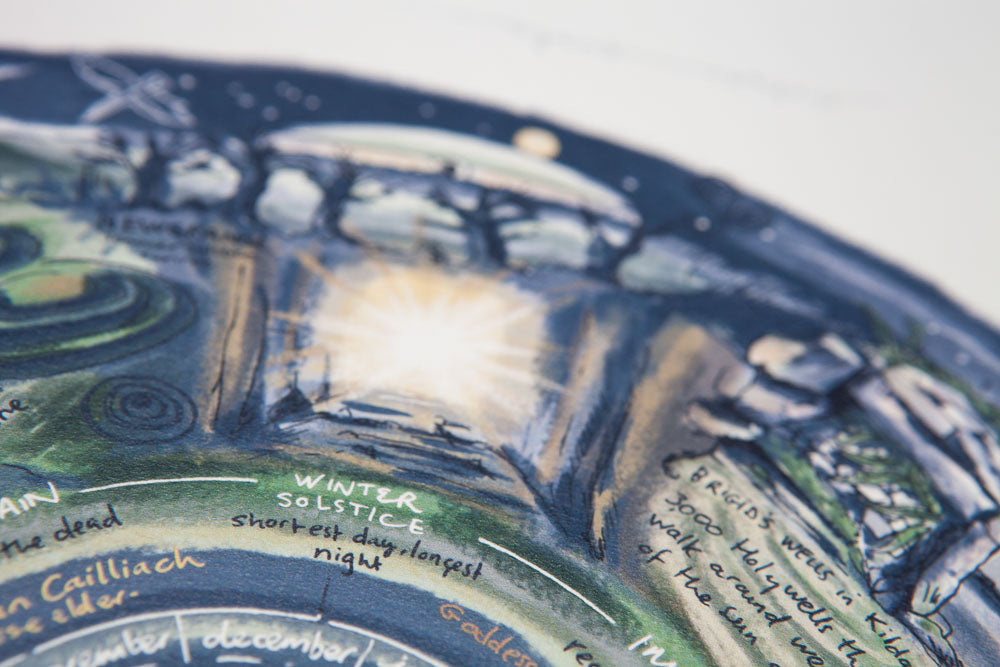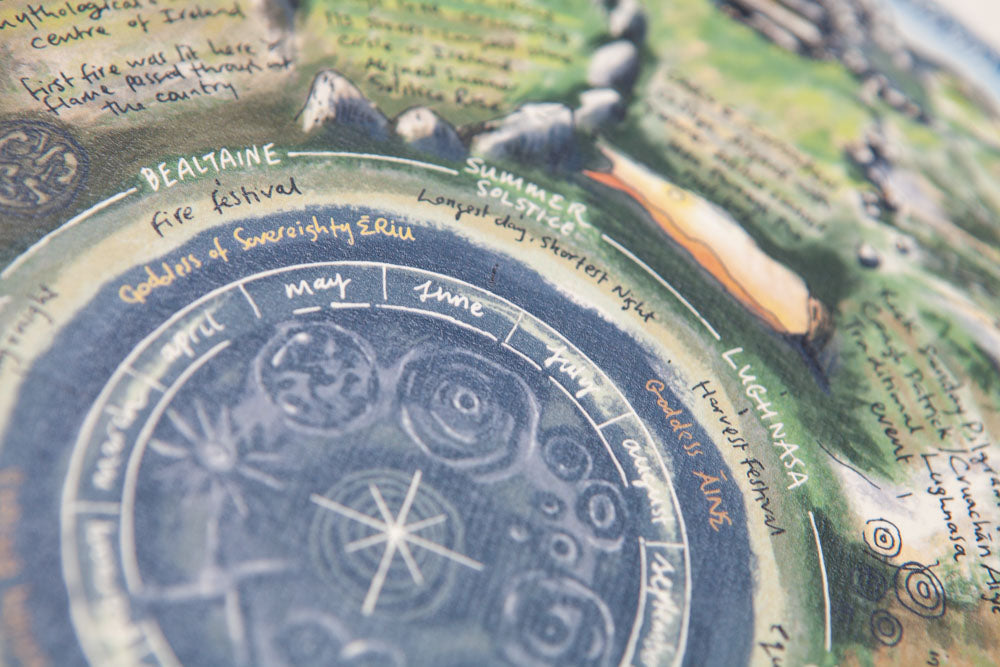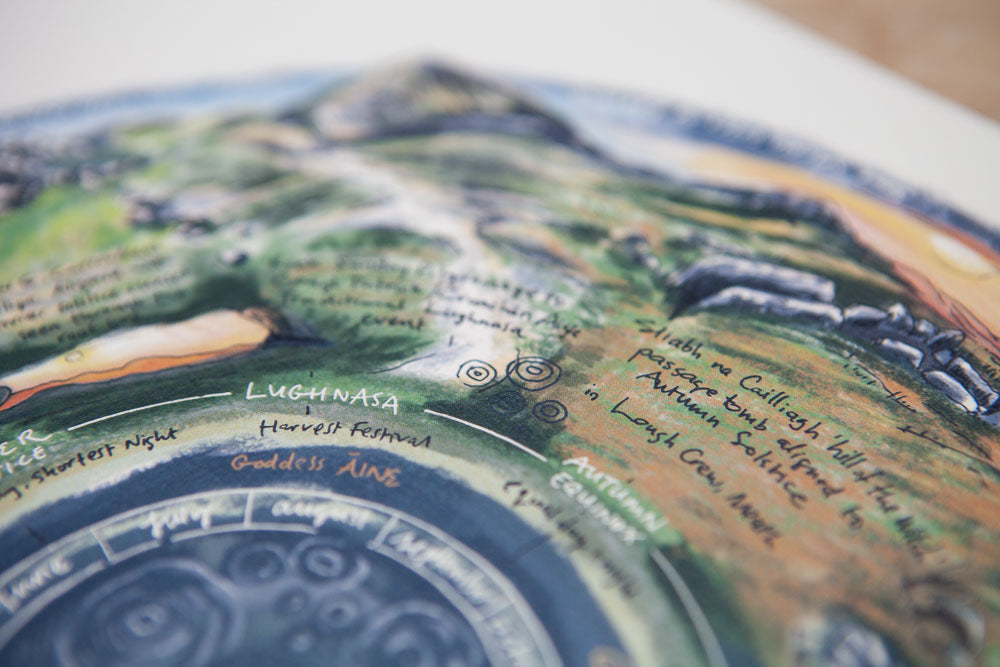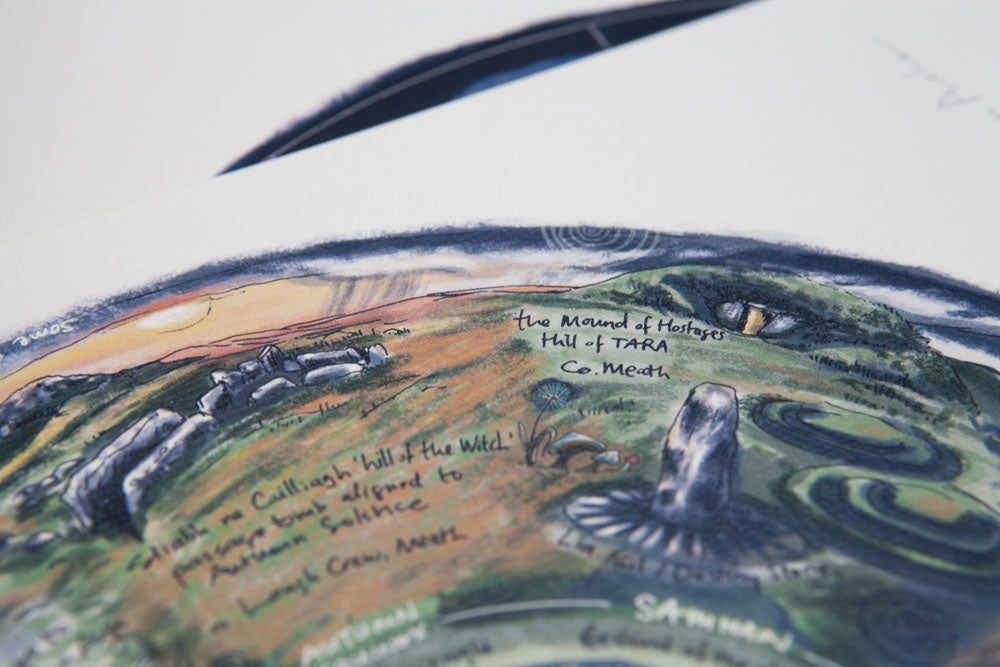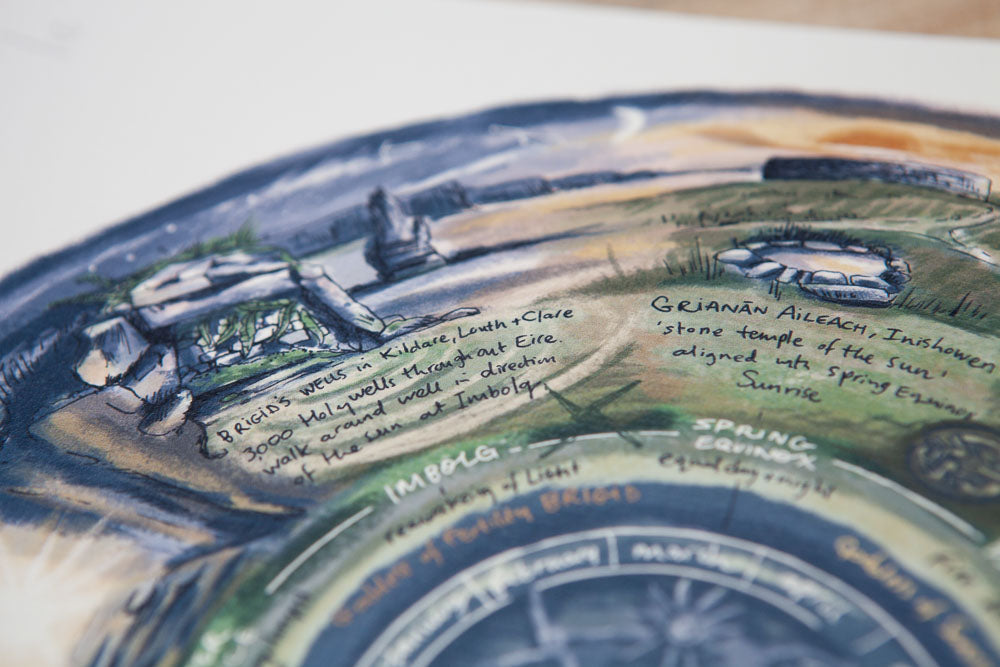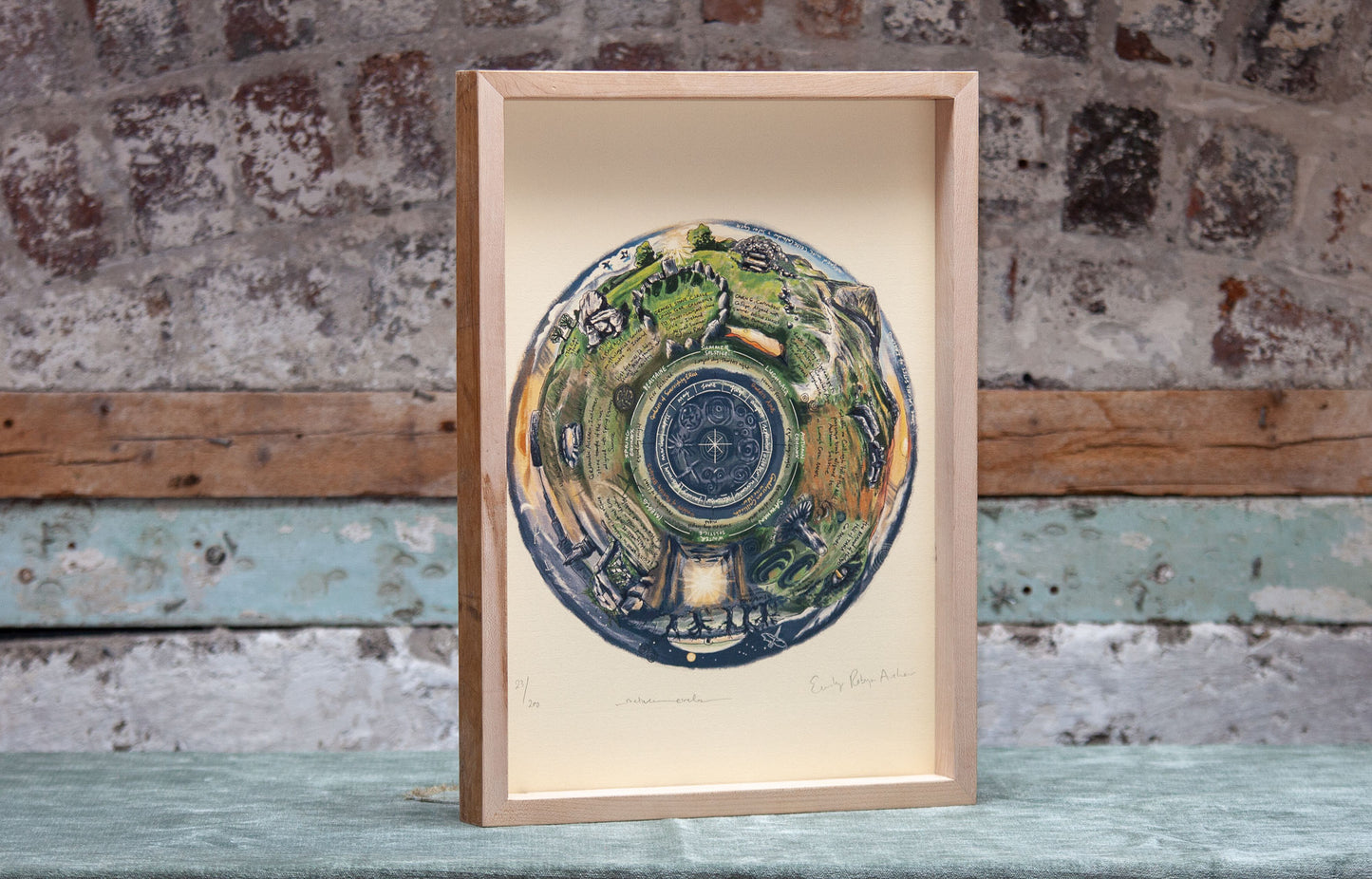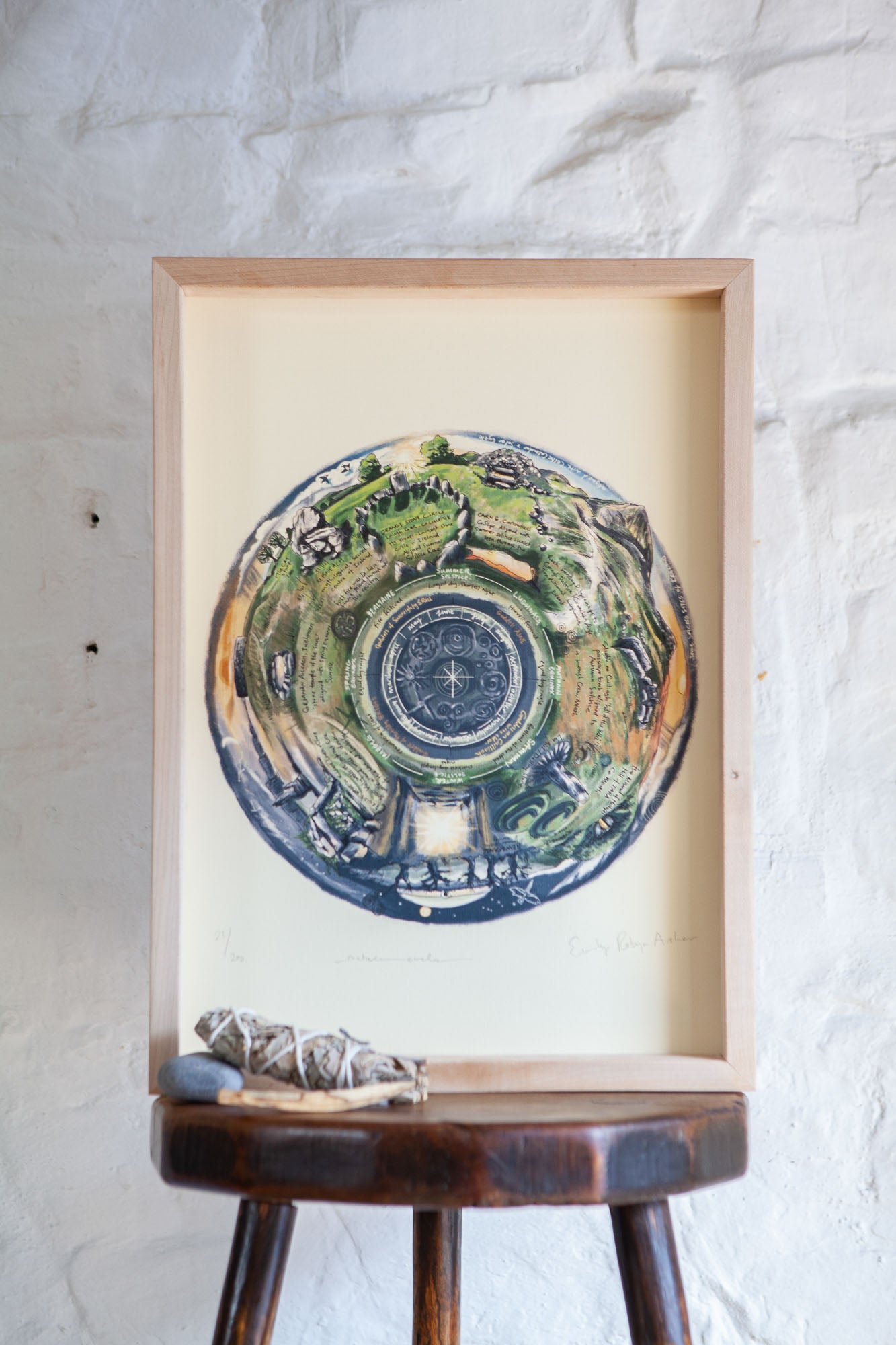Sacred Sites of Ireland — Limited Edition Print on Paper
A stunning calendar print of an original pen drawing on high-quality laid or hammered paper. Signed and editioned by the artist Emily Robyn Archer. Suitable for framing or display in our bespoke magnetic print hangers.
**The dimensions of this print have changed. They are square rather than the original rectangular and are 320mm x 320mm. This means they can be turned four times in a cycle. The Circle image size remains at 29cm diameter. Frames are also available for this size print.
Printed on Conqueror Vellum Chamois Paper 250g/m2 at Dublin Print Co.
***For shipping framed prints outside the island of Ireland, the option is frame without glass. We provide exact dimensions of the glass needed for sourcing locally. It has proved too difficult to ship frames internationally and have the glass remain in tact on arrival***
This Circle is for those enchanted by ancient sites. Cross the thresholds between seasons with the sacred sites of our ancestors.
Ireland has thousands of sacred sites, from ancient Passage tombs, Stone circles, Portal dolmens, Ogham stones, Holy Wells and Sheela Na Gigs. These incredible monuments are dotted all over our landscape.
Many of these sites were designed to facilitate a particular solar alignment. We are familiar with Newgrange and its alignment with the winter solstice; the light of the rising sun spilling through the passage and into the main chamber just once a year.
Many other sites were built to have specific solar alignment at different points in the Wheel of the Year. For example, the Sliabh na Caillaigh passage tomb aligns with the autumn equinox sunrise. Certain Celtic festivals are associated with other sites, holy wells or sacred hills. For example, the first Bealtaine fire was historically lit at the Hill of Uisneach; remarkably, people in Ireland have revived this tradition in recent times.
We may never understand the full importance or stories of these sacred places, but their placement and alignment tell us how important the Wheel of the Year was to our ancestors, who lived by the sun, moon and stars, and deeply honoured the land. These mysterious sites can lift us out of our everyday experiences and reconnect us to nature, the land and our ancestors.
Take a closer look:
At the centre of the print, you'll notice motifs carved into the stones at some of our most sacred sites. Encircling these are the 12 months of the year, followed by a further circle with the Wheel of the Year and its eight festivals.The outer circle depicts nine sacred sites and some folklore associated with them. I sometimes joke that the faeries took over while I was painting this piece — I had a plan for what colours I would use, but they ended up completely different! The final piece here shows the dark half of the year in nighttime colours, appearing between the sunset on one side and the sunrise on the opposite side. The light half of the year appears in daytime tones, between the sunrise and sunset.
Follow the Wheel of the Year through Sacred Sites:
Samhain at the Hill of Tara
Samhain is the first season of the Celtic new year. The Celts believed the veil between us and the spirit world was at its thinnest during Samhain when we were more able to commune with our ancestors. Samhain is the root of modern-day Halloween. Samhain is strongly associated with two prominent monuments at the Hill of Tara: the mound of hostages and the Lia Fail, or Destiny Stone.
Winter solstice at Newgrange
As the light fades and a winter chill sets in, we approach the shortest day of the year and the longest night. We can imagine how it felt to our ancestors to witness the morning light on this day, crossing the threshold where days would start to lengthen and light would return. Newgrange is said to have been constructed about 5,200 years ago, making it older than Stonehenge and the Great Pyramids of Giza. Newgrange is a large circular mound 85m long with a stone passageway and chambers inside. The mound is ringed by 97 large kerbstones, some of which are engraved with symbols of megalithic rock art. The most impressive of these is the entrance stone. Every year in Ireland, a lottery system decides who gets to sit inside its inner chamber to watch the sunrise on the winter solstice.
Imbolg at Brigid’s holy wells
After the winter solstice, we enter the season of Imbolg. Although the weather's still cold, there is a gradual warming of the soil and a feeling of reawakening after a long winter sleep. Imbolg is celebrated at the beginning of February, coinciding with Brigid’s Day. Imbolc means "in the belly," referring to the fertility associated with this time. Seeds tucked underground prepare to sprout and animals bear young that will feed on summer’s bounty.
Brigid’s holy wells are connected to this time of fertility and life returning. There are many holy wells associated with St. Brigid throughout Ireland. One of the most visited of these wells is just outside Liscannor in County Clare. You can hear the sound of running water in this old well, and reach down to touch water that's rumoured to have healing powers. This area of Clare is near the Cliffs of Moher and shares an affinity with the goddess Brigid and Imbolg. This is why you'll notice the Cliffs of Moher at this point in the Circle.
Spring equinox at Grianán Aileach
This is the point in the year when day and night are equal in length, falling right between the summer and winter solstices. Grianán Aileach is a huge ringfort on the Inishowen peninsula with a solar alignment to the sunrise on the spring equinox. It is said that it was built by the Tuatha de Danann, a race of faery people who inhabited this land before the Celts. Legend states that the giants of Inishowen are lying sleeping, but if the sacred sword is removed, they will spring to life to reclaim their ancient lands.
Bealtaine at the Hill of Uisneach
Next, we enter Bealtaine. This is the season of flowering and celebration. Like the flowers, we are urged by nature to expand beyond our comfort zone and take risks. It's a joyous, celebratory time usually marked by fire. The most well-known of these Bealtaine fires happen each year on the Hill of Usneach, known as the centre or "naval" of Ireland. On Bealtaine, the Celts lit the first ceremonial fire here and passed the flame outward through the country. This tradition continues to this day.
Lughnasa at Croagh Patrick
The harvest festival Lughnasa begins in August. Fruits are ripening and summer plants are ready for picking and eating. This season brings feelings of abundance and gratitude. There is a tradition of climbing the slopes of Croagh Patrick or Cruachán Aigle at Lughnasa.
Autumn equinox at Sliabh na Cailliagh
The autumn equinox marks a time of balance between light and dark, day and night, and masculine and feminine. The Sliabh na Caillaigh, or Hill of the Witch, has a solar alignment with the sunset on the autumn equinox.
The expertise behind this print:
This print was designed in collaboration with archaeologist and spiritual explorer Deirdre Kavanagh. Deirdre is passionate about connecting with sacred sites, and her knowledge and wisdom were integral to the creation of this print.
Couldn't load pickup availability
Why follow these cycles?
Why follow these cycles?
Native Circles invites you to slow down and notice natural phases and seasonal changes around you. These cycles offer us perspective, opportunities to reflect, and a sense of grounding in nature. Think of them as a field guide to a simpler life more connected with the wonder of the natural world.
About Native Circles
About Native Circles
Native Circles are a set of simple illustrations that create space for connecting with nature and self-reflection in our homes. The prints are mounted onto a birchwood wheel that you can place on a table or easily install on a wall. They can be turned by hand with the changing seasons.
I recommend choosing one of the specially designed wood stands to display your new wheel - this lets you interact with your wheel by turning it with the change of the season or cycle. Choose a small stand to hold one wheel or a large stand that can hold three wheels, allowing you to build a collection of your favourite cycles.
Unique Elements
Unique Elements
- Hand-drawn by artist Emily Robyn Archer
- Created in Wicklow
- Consciously produced
- Interactive, collectable set
- Native Irish tree planted for every set purchased
Dimensions
Dimensions
- Wheel Image: 29cm diameter
- Print Size: A3 / 45 cm x 32 cm
- Frame: is 34 cm width, 47 cm height, 4.2 cm depth
Specifications
Specifications
Printed on Zeta Ivory Hammered Paper 250g/m2
Returns & Refunds
Returns & Refunds
I’m a Return and Refund policy. I’m a great place to let your customers know what to do in case they are dissatisfied with their purchase. Having a straightforward refund or exchange policy is a great way to build trust and reassure your customers that they can buy with confidence.
